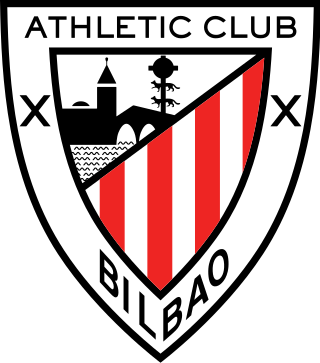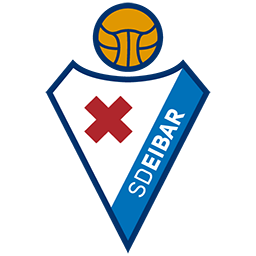
The Campeonato Nacional de Liga de Primera División, commonly known as the Primera División or La Liga and officially known as LaLiga EA Sports since 2023 because of sponsorship reasons, is the top men's professional football division of the Spanish football league system. It is controlled by the Liga Nacional de Fútbol Profesional and it is contested by 20 teams over a 38-matchday period.

Athletic Club, commonly known abroad as Athletic Bilbao, or simply as Athletic domestically, is a professional football club based in the city of Bilbao in the Basque Country, Spain. They are known as Los Leones because their stadium was built near a church called San Mamés, which was named after Saint Mammes, an early Christian thrown to the lions by the Romans. Mammes pacified the lions and was later made a saint. The team plays its home matches at the San Mamés Stadium. Its home colours are red and white-striped shirts with black shorts.

The Basque Country is the name given to the home of the Basque people. The Basque Country is located in the western Pyrenees, straddling the border between France and Spain on the coast of the Bay of Biscay.

Football is the most popular sport in Spain, with 61% of the population interested in it. Spain has some of the most influential teams in Europe as well as many players and teams registered in all categories. Moreover, football is the sport that interests the majority of Spanish people (48%) and a total of 67% of the population said they were fans of or had a liking for a particular club.

The Greece national rugby league team represents Greece in rugby league. The team has been participating in international competition since 2003.
The Basque Country national football team represents the Basque Country in football. It selects players from the Basque Country autonomous community, Navarre and the French Basque Country and is organised by the Basque Football Federation. It is not affiliated with FIFA or UEFA and therefore only allowed to play friendly matches against FIFA or non-FIFA affiliated teams.

Rugby union is a growing team sport in Spain. As of 2019, there were 37,241 registered rugby union players in Spain, playing for 332 clubs in various divisions. The sport's governing body in Spain, the Spanish Rugby Federation, was founded in 1923. It joined the International Rugby Board in 1988, and is also a member of Rugby Europe.
Joan Ramón 'Juan' Epitié Dyowe Roig is a former professional footballer who played as a forward. Born in Spain, he played for the Equatorial Guinea national team.

The San Mamés Stadium is an all-seater football stadium in Rafael Moreno Pitxitxi Kalea, Bilbao, Basque Country, Spain. Inaugurated on 16 September 2013, the stadium replaced the "old" San Mamés as the home of Athletic Bilbao. With a capacity of 53,331 seats, San Mamés is the 7th-largest stadium in Spain and the largest in the Basque Country.
División de Honor B is the second level of Spanish league competition for rugby union clubs. The league began in 1998 and consists of three groups of 8 or 9 teams each. The two top teams of each group and two best 3rd-placed teams qualify for promotion playoff.

The Basque Autonomous Community [ A.C.], also officially called Euskadi [], is an autonomous community in northern Spain. It includes the Basque provinces of Araba, Bizkaia, and Gipuzkoa. It also surrounds an enclave called Treviño.
The Catalonia rugby union team is the national and/or representative rugby union team of Catalonia. It is organised by the Catalan Rugby Federation and has been active since 1923. On 14 April 1934 they made their international debut with a 5–5 draw at the Camp de Les Corts against Italy.

SD Eibar Femenino is a Spanish women's football team from Eibar, Gipuzkoa, Basque Country, currently playing in Liga F. It is the women's section of SD Eibar.

The Royal Madrid Football Federation is the governing body of the sport of football in the Community of Madrid, Spain. Its headquarters are in the city of Madrid.

The Basque Football Federation is the body responsible for managing association football in the Basque Country autonomous region. Its offices are in Bilbao.
Basque Country women's national rugby union team is the national and/or representative women's rugby union team of the Basque Country. It is organised by the Basque Rugby Federation and has been active since 1994–95. Unlike the men's team, the Basque Country women's team have only played a small number of international games. They regularly play friendlies against club and provincial teams.

The cantera (quarry) of Spanish professional football club Athletic Bilbao is the organisation's youth academy, developing players from childhood through to the integration of the best prospects into the adult teams.
The cantera (quarry) of Spanish professional football club Real Sociedad is the organisation's youth academy, developing players from childhood through to the integration of the best prospects into the adult teams.
Basque Country national rugby union team is the national and/or representative rugby union team of the Basque Country. It is also sometimes referred to as the Basque Selection. They made their international debut on 14 May 1983 against Wales while the latter were on a tour of Spain. The Basque Country lost this game 3–24. Since 1985 the team has been organised by the Basque Rugby Federation.
Athletic Club Femenino B is a Spanish women's association football team based in Bilbao, in the autonomous community of the Basque Country, Spain.









